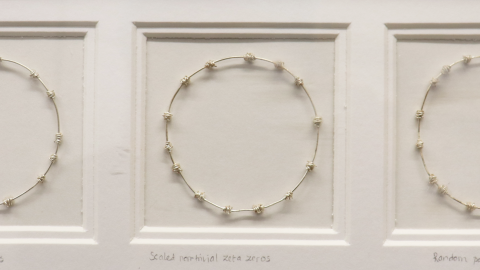15:30
Relative Invertibility and Full Dualizability of Finite Braided Tensor Categories
Abstract
I will discuss an enriched version of Shimizu's characterizations of non-degeneracy for finite braided tensor categories. Using these characterizations, it follows that an enriched finite braided tensor category is invertible as an object of the Morita 4-category of enriched braided tensor categories if and only if it is non-degenerate. As an application, I will explain how to extend the full dualizability result of Brochier-Jordan-Synder by showing that a finite braided tensor category is fully dualizable in the Morita 4-category of braided tensor categories if its symmetric center is separable.
13:00
Topological Quantum Dark Matter via Standard Model's Global Gravitational Anomaly Cancellation
Abstract
symmetry is preserved as discrete finite subgroups rather than a continuous U(1), the perturbative
local anomalies become nonperturbative global anomalies. We systematically enumerate
these gauge-gravitational global anomalies involving discrete B ± L that are enhanced from the
fermion parity ZF2 to ZF2N , with N = 2, 3, 4, 6, 9, etc. The discreteness of B ± L is constrained by
multi-fermion deformations beyond-the-SM and the family number Nf . Unlike the free quadratic
νR Majorana mass gap preserving the minimal ZF2 , we explore novel scenarios canceling (B ± L)-gravitational anomalies
of the family number at Nf = 3, such that when the representation of ZF2N from the faithful B + L
for baryons at N = Nf = 3 is extended to the faithful Q + NcL for quarks at N = NcNf = 9, this
symmetry extension ZNc=3 → ZNcNf =9 → ZNf =3 matches with the topological order dark matter
construction. Key implications include: (1) a 5th force mediating between SM and dark matter via
discrete B±L gauge fields, (2) dark matter as topological order quantum matter with gapped anyon
excitations at ends of extended defects, and (3) Ultra Unification and topological leptogenesis.
The community mile is a mass event, open to all abilities and ages from six and above. The course (1 mile long) will start on St Aldate’s and proceed down the High Street, crossing Magdalen Bridge before finishing on Iffley Road, where bespoke finisher medals will be presented.
From 9 am on Monday 5th May.
In this case study we survey the historical development of $\mathrm{Lip}(\gamma)$ functions, beginning with the work of Hassler Whitney from the 1930s and ending with some of the recent properties established by Terry Lyons and Andrew McLeod that are particul
12:00
Non-commutative derived geometry
Abstract
I will describe a non-commutative version of the Zariski topology and explain how to use it to produce a functorial spectrum for all derived rings. If time permits I will give some examples and show how a weak form of Gelfand duality for non-commutative rings can be deduced from this. This work is in collaboration with Simone Murro and Matteo Capoferri.
14:15
Towards a gauge-theoretic approximation of codimension-three area
Abstract
In the last three decades, a fruitful way to approximate the area functional in low codimension is to interpret submanifolds as the nodal sets of maps (or sections of vector bundles), critical for suitable physical energies or well-known lagrangians from gauge theory. Inspired by the situation in codimension two, where the abelian Higgs model has provided a successful framework, we look at the non-abelian SU(2) model as a natural candidate in codimension three. In this talk we will survey the new key difficulties and some recent partial results, including a joint work with D. Parise and D. Stern and another result by Y. Li.



